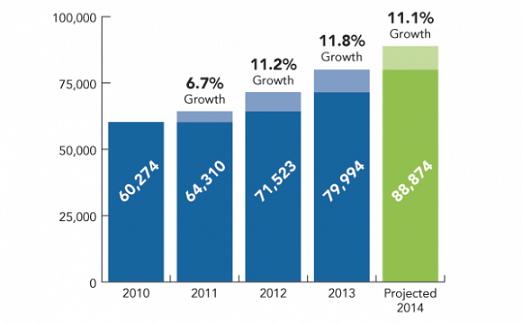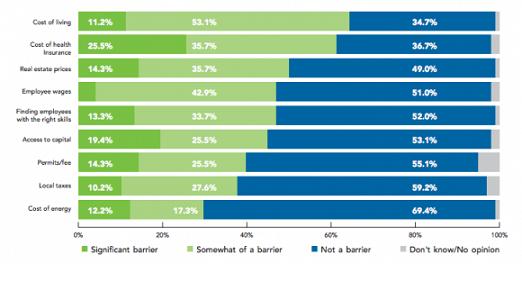A Real Plan to Reduce US Carbon Emissions
February 13, 20141,000+ Health Care Professionals Call on President Obama to Halt Fracking
February 21, 2014By Stephen Lacey, greentechmedia, September 19, 2013
Five years after signing one of the nation’s most progressive pieces of energy legislation into law, Massachusetts continues to see strong growth in solar, wind, efficiency and high-technology jobs throughout the clean energy industry.
The latest progress report from the Massachusetts Clean Energy Center (MassCEC) shows that jobs in the clean energy sector have grown by 24 percent since 2011, with nearly 80,000 people directly employed in the industry. The overall job growth rate in Massachusetts has been 3 percent since 2011.
As energy expert John Hanger points out over at his blog, that’s more than twice the number of natural gas jobs created in Pennsylvania from the surge of fracking. It’s also considerably more than the 64,000 direct and indirect jobs created in North Dakota by the unconventional oil and gas boom.

Massachusetts Job Growth in the Clean Energy Sector
According to the report, Massachusetts now has 5,557 employers in the sector, most of them small businesses. The jobs are spread throughout a diverse range of sectors, including renewable energy manufacturing and installation, efficiency contracting, carbon management, and engineering services. Nearly 60 percent of the jobs are in the solar industry.
There is a caveat to these figures: only 38.8 percent of the firms accounted for get all revenue from clean energy work. About one quarter of firms get less than 25 percent of revenue from work in the sector. This is because the MassCEC counts small plumbers and HVAC contractors doing efficiency and solar work as part of their business. This highlights the difficulty of defining a clean energy job — an exercise that has aroused a war of words between among congressional Republicans and green jobs proponents. (This is one of the reasons why proponents have almost entirely halted their use of the term “green jobs” recently.)
Although critics have claimed that clean energy development will stifle economic development by raising the cost of energy and taxes, the experience in Massachusetts is showing just the opposite. As the survey results below show, the vast majority of companies say that taxes and energy costs are not a barrier to setting up shop in the state.

Massachusetts is well known for its strong university system, high-tech industry and venture capital community — all elements that have contributed to the support for building the clean energy sector. Those factors, combined with a strong set of incentives for renewable energy and efficiency, have caused the industry to grow far faster than the rest of the economy.
“This year’s report provides further evidence that this remarkable rate of growth hasn’t occurred by accident — it’s by design,” wrote the authors.
In fact, the clean energy industry is now such a big part of the culture in Massachusetts, it’s become a statewide craze to eat on solar panel tables.
Kidding aside, Massachusetts has definitely been on a roll lately.
Earlier this week, Boston was crowned the most efficient city in America. And over the last year, the city has started implementing a strong climate resiliency plan and a new energy benchmarking law that will track energy use in 40 percent of buildings.
When clean energy becomes as important in Bay Staters’ minds as the Red Sox-Yankees rivalry, we’ll know that the industry has truly arrived.



